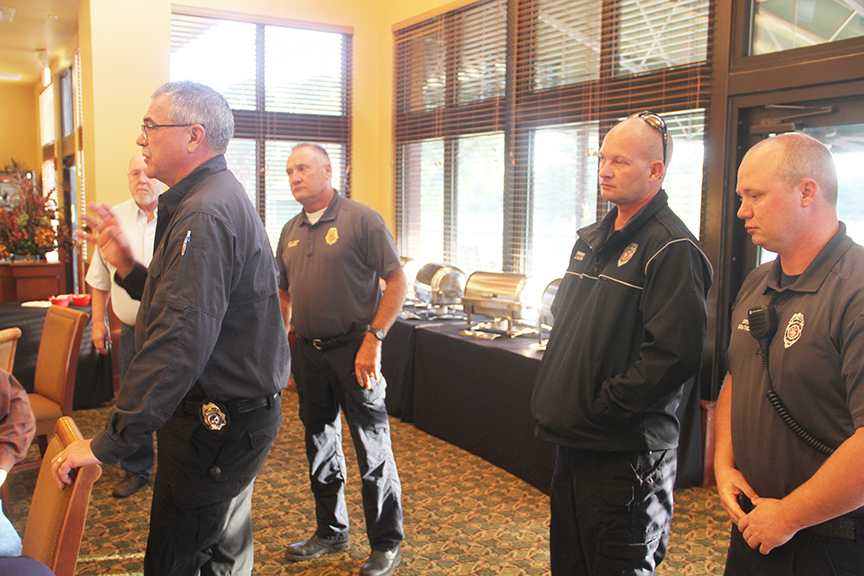
Millington Fire Chief Gary Graves has established himself as one of the city’s leaders since taking over the job more than a decade ago. His defining moment came early in his tenure with the 2010 May Day Flood.
By Thomas Sellers Jr.
Back in 2009 a new face came to Millington to take over the role as Fire Chief of the Millington Fire Department.
With 25 years of experience, Gary Graves was ready for the job and to take on the responsibilities of leading the department. Fast forward to the night of April 30, 2010, Graves stamped his legacy as one of the best chiefs with his leadership during the May Day Flood of 2010.
“Going back and looking at all of that,’ Graves said, “anytime we have potential for severe weather, I get emails from the National Weather Service. So leading up to that event, we had started getting emails and notifications of a potential severe weather event of flash floods and possible tornadoes maybe the middle of that week around Tuesday.”
The reports were the usual memos but Graves stayed prepared just in case of the worst scenario coming to fruition.
“We had about a three or four day notice for the possibility of severe weather that Saturday morning,” he recalled. “We had sent that out to all of our department directors and people that needed to know in the city about it.
“Surely early Saturday morning it started raining,’ Graves continued. “It kept raining. So it was about 6:30 a.m., of 2010 the fire department started receiving calls of water rescues from water getting in people’s houses like that. When we got out on the street, we started realizing this has the potential to turn into a big event.”
On the job for less than a year, Graves had no hesitation in taking control of the situation.
“It kept raining throughout the day,” Graves recalled. “As folks remember, we had two tornado warnings. One during the day time and one during that Saturday evening about 8:30 or 9 o’clock, a small tornado actually touched down near USA Stadium. It touched down in the field just south of USA Stadium in the rain.
“I set up a command post at the police department,” he continued. “I was managing everything that was going on around. I did not know the impact of how much water was there until we moved our command post from the police department over to the fire station. It wasn’t until 4 o’clock I realized and saw how deep the water was when we were going down Navy Road.”
Graves kept a journal and timeline of every call, notice, event and action taken that day to keep the residents of Millington safe. Graves directed the department leaders to give their personnel the right commands to help residents evacuate.
“So from 6 a.m. to 4 that afternoon, I was inside of a building managing everything,” he noted. “I was trying to visualize from all the radio traffic of all of what was going on. I guess in hindsight it worked out better for me because I was able to concentrate more on what the crews needed more so than worried about water. It wasn’t until we moved the command bus from the police department to the parking lot across the street from the fire department.”
The hardest hit areas were Bill Knight (Indian Meadows), Shelby Oaks, NSA Activity Mid-South and east of the base in the Cloverhaven area.
“It was a very trying day mentally and obviously physically for us,” he recalled. “But we went through all of that without any injuries or lives lost. That was a God sent.”
That fact was celebrated throughout the country because the rains moved east that day. And floods occurred across Tennessee with lives being lost.
“I had been in Millington for less than a year when this happens,” Graves said. “I came in July of ’09 and this takes place in the latter part of April entering May. I’ve been here for less than 12 months.
“Mayor (Richard) Hodges came in and we jokingly talk about it now,” he continued. “He’ll tell you the same thing. I told Mayor Hodges ‘I got a job to do.’ Of course he came in asking questions. I wanted to give him what he needed to do as mayor. But I told him, ‘Let me get through this and I’ll get you through this. And I’ll let you know what you need to do as mayor. But right now this is an emergency and I’ll get back to you.’”
Hodges’ willingness to step aside and let the man the city hired as fire chief do his job.
“We kid about it now and of course I meant that with respect to Mayor Hodges and whoever were the administrative officials are at that time,” Graves said. “I was focused on the response side of it and the mitigation said of it. How we can do what we needed to do. If it hadn’t been for our firefighters, police officers and public safety workers at the time in the city and even our citizens played a big role in the efforts.”
Since the May Day Floods, Graves has taken steps to ensure an even better response if another disaster hits.
“I’m big on building relationships and having those relationships in place,” he said. “When that happened, one of the first phone calls I made was to Shelby County Emergency management and their director.”
Millington had to tap in the resources of the Tennessee Emergency Response and other municipalities. Once the water started to evaporate and it was time to pick up the pieces, Graves had to be the next phase of leadership.
“Then the real work began after that,” he recalled. “Answering people’s questions, have the answer, putting the community to ease.”
Community meetings, informing the media of updates and going door to door was Graves and staff’s next job in the recovery effort.
“The people came forward, the community came forward, the churches come forward, different agencies came in and started helping people recover,” he recalled. “I remember having all these visits from the FEMA director. Our two senators from Washington came in and did a bus tour with Mayor Hodges. All the key players from local, state and federal government came into Millington themselves to tour and helped us recovery.”
The storm that hit that Saturday led to the public safety workers of Millington cleaning up that Monday. Then the hot summer saw Graves helping guide parts of the relief effort and sharing those notes he kept in Washington D.C.
“The mayor and I testified in front of a senate Subcommittee along with Nashville reps,” he said. “I was proud to say, ‘Millington, we endured a tragic event and people lost a lot of stuff. But we go back to zero loss of life and zero injuries to our citizens.’”
Graves said in 2020, Millington is in a better position if another flood pops up.
“Right now we fast forward 10 years, the city with the help of Shelby County are recipients of a $40 million resiliency grant to help rectify that Big Creek flood area,” he noted. “Within next couple of years start seeing physical work being done 12 to 18 months to help make sure the Navy Base doesn’t shut down again.”
The MFD has more resources just in case of a rescue effort.
“The Fire Department now owns a rescue boot and developed a swift water rescue resources and all personnel are trained in swift water response,” Graves said. “We now have everything we need in Millington to make a swift water response.”
Graves is still working on developing relationships with other departments across the state and Mid-South.
“We’re way ahead of where we were in 2010 as far as developing resources to respond to that type of event,” he said. “We hope and pray it doesn’t happen again. But the good Lord is in charge of the weather. If something like that was to come up, we have the resources setting in our fire station to respond.”
Graves said he is glad that day ended without any Millington residents perishing. And the events and response to that day gave life to Graves’ legacy as a leader in Flag City.
“I was new to Millington and I knew I had a job to do,” he said. “Professionally this was going to either make me or break me, just being straight up honest with you. If it was a success, it was going to be a success of the people we worked with.
“I don’t take any credit for the success of that response to that,” Graves concluded. “However knowing that, if it had been a failure, then I shouldered that responsibility solely for the failure of that. I understand where my position is and the accept that. Yes I command that but our men, women and citizens were the one actually out there doing the work. I was in a command bus trying to allocate our resources.”





